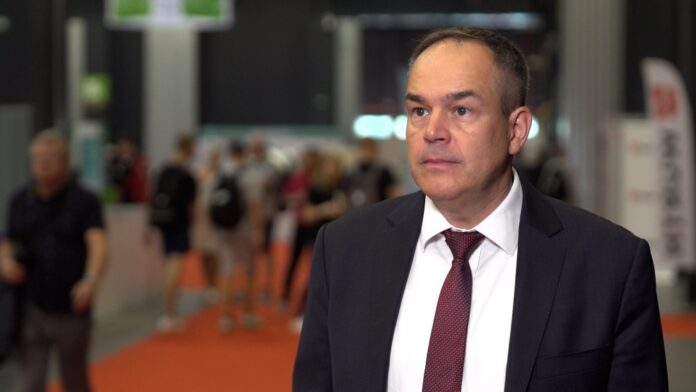In Poland, the unemployment rate remains at a record low, and the demand for new employees is growing faster than their supply, especially in manufacturing companies and technical professions. According to a survey by Grafton Recruitment, more than half of industrial employers identified securing employees with the right qualifications as their biggest challenge this year. One reason often cited by experts is the insufficient frequency of choices for vocational education and technical universities. Therefore, companies are eager to get involved in initiatives promoting technical professions.
“When we hear about a shortage of workers in the market, we often think about programmers or doctors, but we are also facing a shortage of staff in technical industries, and this is a big challenge. We operate in many markets related to automotive, construction, installations and broadly defined industry. It is often difficult to find suitable professionals. We are managing, but it is not easy. Hence, we invest in the development of existing employees and support initiatives such as EuroSkills, which promotes industrial professions and educates future professionals,” Robert Karolak, marketing director of Würth Poland, a partner of EuroSkills, told Newseria Biznes agency.
According to the latest “Talent Shortage” report by Manpower Group, 72 percent of Polish companies are currently struggling to fill job positions with new employees with desired skills (an increase by 2 percentage points from the previous year). Among the top 3 searched competencies – apart from IT and data analysis, sales and marketing – are technical skills. Grafton Recruitment’s “Industry Salary Report” indicates that this was the biggest challenge for over half of the employers in this sector after the first quarter of this year. Still, despite the weakening economy, most companies planned to increase employment or maintain it at the current level. The industry sector continues to be dominated by specialists.
Similar situations are being experienced in other countries. According to global research cited by Randstad, 87 percent of employers around the world are currently struggling with a shortage of desired skills. One reason is the progressing integration of new technologies, artificial intelligence and automation in manufacturing companies. To implement it, employees capable of operating it are needed. Therefore, the increasingly common use of new technological solutions increases companies’ demand to acquire people with appropriate technical skills.
“In terms of competencies that we seek, they encompass all skills related to painting. It is not a very popular profession and it is extremely difficult to find suitable employees in terms of both, quantity and quality,” states Olivier Marion, EMEA regional marketing manager for BASF Coatings, responsible for the Glasurit automotive paint brand. “Issues related to workforce, i.e., finding and keeping the right employees, currently presents the biggest challenge also for our customers.”
Artur Przybylak, country manager of Unox Polska, a manufacturer of convection-steam ovens for the catering and pastry industry, adds, “We have a very wide range of industries in which we operate. Having contact with end customers or dealers of different types, we receive feedback from them about a general lack of market specialists. Hence, when taking on a new employee, we have a basic training system and can teach him the basics, but the rest depends on his willingness, commitment and most importantly – passion. To be honest, that presents the biggest problem today.”
The answer to the labor shortage is vocational education, where employers can realistically shape skills that match their needs. In Poland – after years of neglect and underfunding – vocational education is now gaining popularity, partly due to recent reforms. Still, promotion of technical professions and inspiring young people to choose such a career path is needed.
“Vocational education in cooperation with business can ensure that young graduates of vocational schools, having the right trade in hand and appropriate skills, can find attractive jobs for attractive remuneration without any problem”, says Artur Przybylak.
“In such professions as a mechanic, electrician or welder, theoretical and practical knowledge is very important. Only through vocational education can we obtain them,” adds Robert Karolak. “In Poland, vocational education has been neglected for years and we are pleased that now more attention is being paid in this direction. Initiatives such as EuroSkills 2023 aim to improve the situation.”
The EuroSkills international competition is one of the largest initiatives promoting vocational education. For the first time in history, the competition took place in Poland this year. From 5th to 9th September in Gdansk, nearly 600 young people from 32 European countries, representing 42 professions and industries, competed to become world-class specialists in their craft, including in welding, cooking, floristry, carpentry and hairdressing, robotics and programming.
“EuroSkills is a very important event for young people who often face a difficult choice of a career path. Here, they have a huge chance to see the whole spectrum of possibilities for gaining experience in the future,” says Marcel Pfost, head of training and fairs at Festool. “We have organized workshops for young people who could take a closer look at various technical professions, such as carpentry. Youths can try their hand and see what a given profession consists of, which will make their own decision easier.”
Not only experts and the jury, but also thousands of spectators and employers, including leading global corporations, closely watch the EuroSkills industry competitions. These entities often train the competitors, support them during the competition and scout for talent among the finalists.
“For us, this is one of the most important events of the year. It allows establishing a connection between the brand and potential employees and spreading knowledge that helps people understand that the profession of a painter can be a passion,” adds Olivier Marion.
“The ultimate goal is to find a balance. We need people with academic skills but also those who can work using their hands. If you look around, many things are done not just on a laptop or computer. We need the right people capable of manual work. By starting your adventure as a carpenter or painter, you get a good start for the future. Such work provides tangible results and gives much more satisfaction. Such a profession also provides a good future security blanket,” adds Marcel Pfost.


















